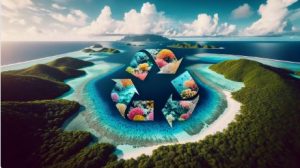Green Footprints Across the Pacific: Best Sustainable Practices for Travelers Visiting Palau
. As custodians of one of the planet’s most extraordinary natural treasures, it is our duty to ensure that the beauty of Palau remains unspoiled for future explorers. In this blog, we will delve deep into the best sustainable practices that you, as a visitor, can adopt to make a positive impact during your stay in this island paradise.
Understanding Palau’s Unique Environment
Before we explore the sustainable practices, it is essential to understand why Palau’s environment is worth protecting. Home to a rich marine biodiversity and recognized as a UNESCO World Heritage Site, Palau’s Rock Islands Southern Lagoon is a treasure trove of coral reefs, lagoons, and natural habitats.
Embracing the Palau Pledge
Palau is the first country in the world to change immigration laws for the good of the environment, asking visitors to sign the Palau Pledge. This written promise to children of Palau includes commitments to:
- Respect and protect the natural environment
- Avoid single-use plastics
- Not to collect marine life souvenirs
Top Sustainable Practices for Your Visit
1. Sustainable Transport
Reduce your carbon footprint by choosing eco-friendly transport options. Palau offers opportunities for:
- Biking around the islands
- Walking nature trails
- Using kayaks or traditional canoes
2. Responsible Tourism
Being a responsible tourist involves making environmentally conscious choices. These include:
- Staying at eco-certified accommodations
- Participating in tours that emphasize conservation
- Respecting local customs and heritage sites
3. Supporting Local Conservation Efforts
Palau’s conservation initiatives are fundamental to preserving its ecosystems. You can support these efforts by:
- Donating to organizations like the Palau Conservation Society
- Volunteering for beach cleanups or reforestation projects
- Choosing souvenirs from local artisans that do not exploit natural resources
4. Mindful Interaction with Wildlife
When diving or snorkeling in Palau’s waters, practice the following:
- Maintain a safe distance from marine life
- Avoid touching or stepping on corals
- Follow responsible wildlife guidelines provided by your guide
5. Reducing Plastic Waste
Plastic pollution is a serious threat to marine environments. Combat this by:
- Using a reusable water bottle and eco-friendly sunscreens
- Avoiding single-use plastics like straws and food containers
- Disposing of waste properly or taking it back with you
Each step you take towards sustainability helps to preserve the natural wonder of Palau. We at Palau Explorer are committed to guiding you through these practices, ensuring that your visit has a lasting positive impact. By following these sustainable tourism practices, you are not just a visitor, but a guardian of this majestic island nation.
FAQs
Do I need to take any precautions with sunscreen to visit Palau’s reefs?
Yes, Palau has banned sunscreens containing chemicals like oxybenzone and octinoxate that studies showed severely damage coral reefs. Pack reef-safe, mineral-based sunscreen to protect marine ecosystems.
What products are restricted or banned to align with Palau’s anti-plastic policies?
Palau bans common single-use plastics like bags, straws, styrofoam containers, and plastic water bottles that easily end up pollution waterways and oceans. Visitors should avoid importing banned items and buy reusable alternatives locally.
How can visitors select the most eco-friendly tours and activities?
Choose tour operators certified by sustainable tourism programs like Green Globe that adhere to environmental practices protecting wildlife, habitats, and communities by limiting group sizes, emissions, waste while respecting cultures.
Is fishing permitted within Palau’s marine sanctuaries?
Recreational fishing follows strict catch-and-release policies but market fishing remains prohibited in protected areas allowing depleted mackerel, tuna and giant clam populations to recover over generations through smart management.
Can visitors help fund or volunteer for Palau conservation programs?
Yes! Ask tour guides about scheduling nursery visits witnessing coral restoration efforts funded by tourism. Limited volunteering expansion continues respectfully allowing more guest participation rebuilding precious reef ecosystems through responsible future focused travel.
Where can I donate directly to support environmental programs in Palau?
Please see www.Kororstate.org to donate directly towards progressive conservation initiatives or contact local organizations like the Coral Reef Research Foundation about supporting science-based reef protections benefiting future visitors.
